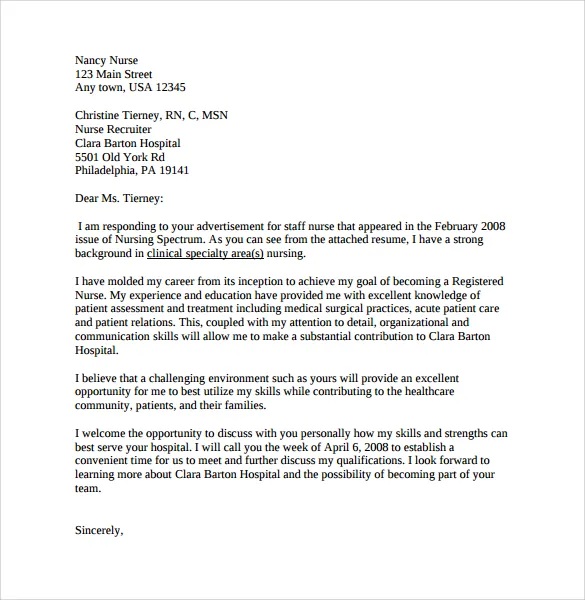Understanding the Nurse Cover Letter
A nurse cover letter is a crucial document that accompanies your resume when applying for a nursing position. It serves as your introduction to the hiring manager, providing an opportunity to showcase your personality, skills, and experience in a way that your resume might not. Unlike a resume, which offers a factual overview of your qualifications, a cover letter allows you to express your passion for nursing, explain why you’re a good fit for the specific role and organization, and highlight your key accomplishments. Think of it as your personal sales pitch, designed to persuade the employer to invite you for an interview. A well-crafted cover letter can significantly increase your chances of landing your dream nursing job.
What to Include in Your Cover Letter
A strong nurse cover letter typically includes several key elements to effectively communicate your qualifications and enthusiasm. Ensure that you present yourself professionally, clearly articulating your value proposition to the hiring manager. Each section should work in concert to create a cohesive narrative that highlights your strengths and aligns with the specific requirements of the job. Missing any of these key sections could negatively affect your overall first impression, making it important that you’re organized and that you include all relevant information.
Your Contact Information
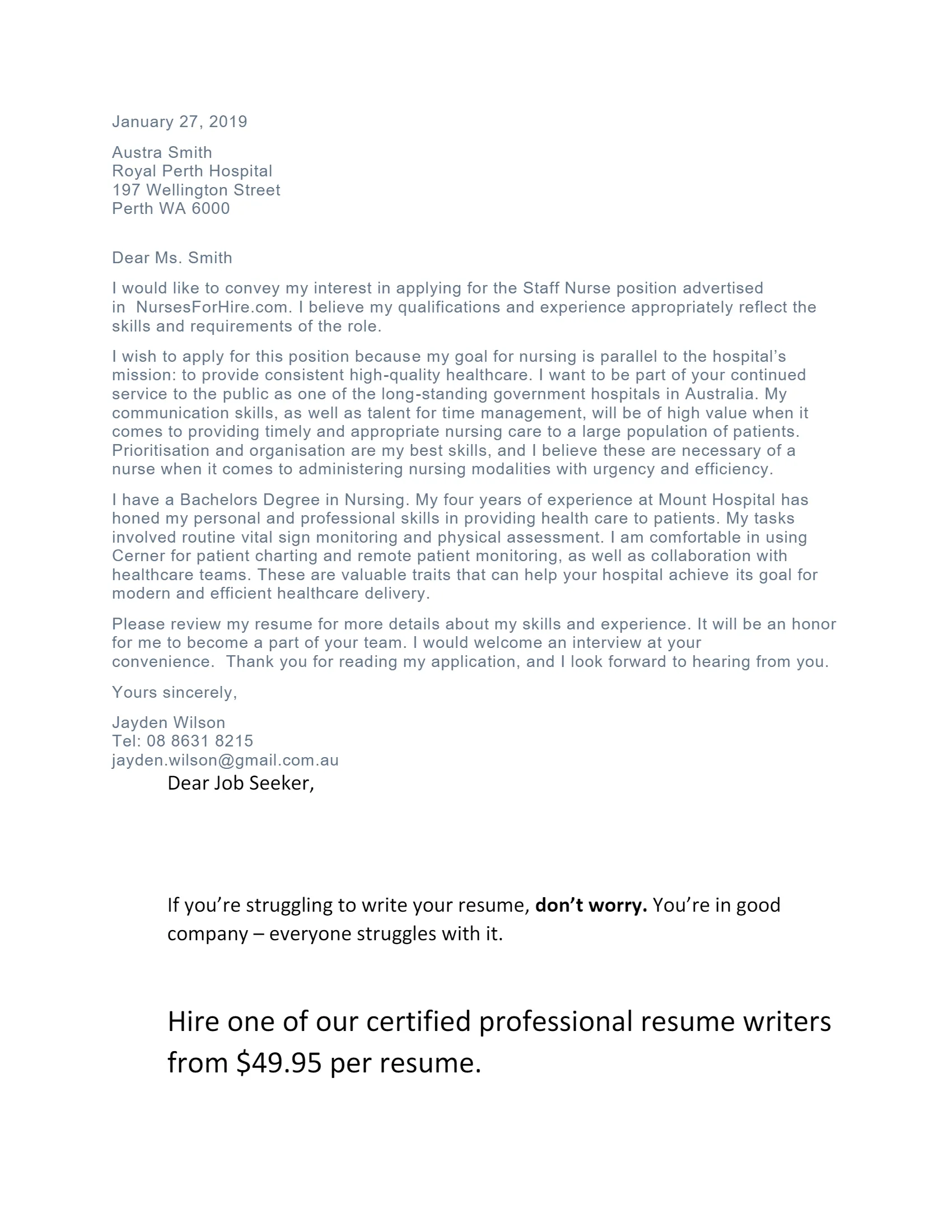
At the top of your cover letter, include your full name, address, phone number, and professional email address. Make sure your email address is professional and easy to read. This information allows the hiring manager to easily contact you. Ensure that all the details are accurate and up-to-date.
The Hiring Manager’s Contact Information
If possible, address your cover letter to a specific person. Research the hiring manager’s name and title on the company’s website or LinkedIn. If you can’t find a specific name, address it to the ‘Hiring Manager’ or the appropriate department. This personal touch demonstrates that you’ve taken the time to research the company and are genuinely interested in the role. Including this information shows attention to detail and initiative.
The Greeting
Use a professional greeting, such as ‘Dear Mr./Ms./Dr. [Last Name]’ or ‘Dear Hiring Manager.’ Avoid generic greetings like ‘To Whom It May Concern.’ This sets a professional tone from the start. If you know the hiring manager’s name, using it shows a level of personalization. If not, using ‘Hiring Manager’ is acceptable. Proper greetings signal respect and professionalism.
Opening Paragraph [Grab Attention]
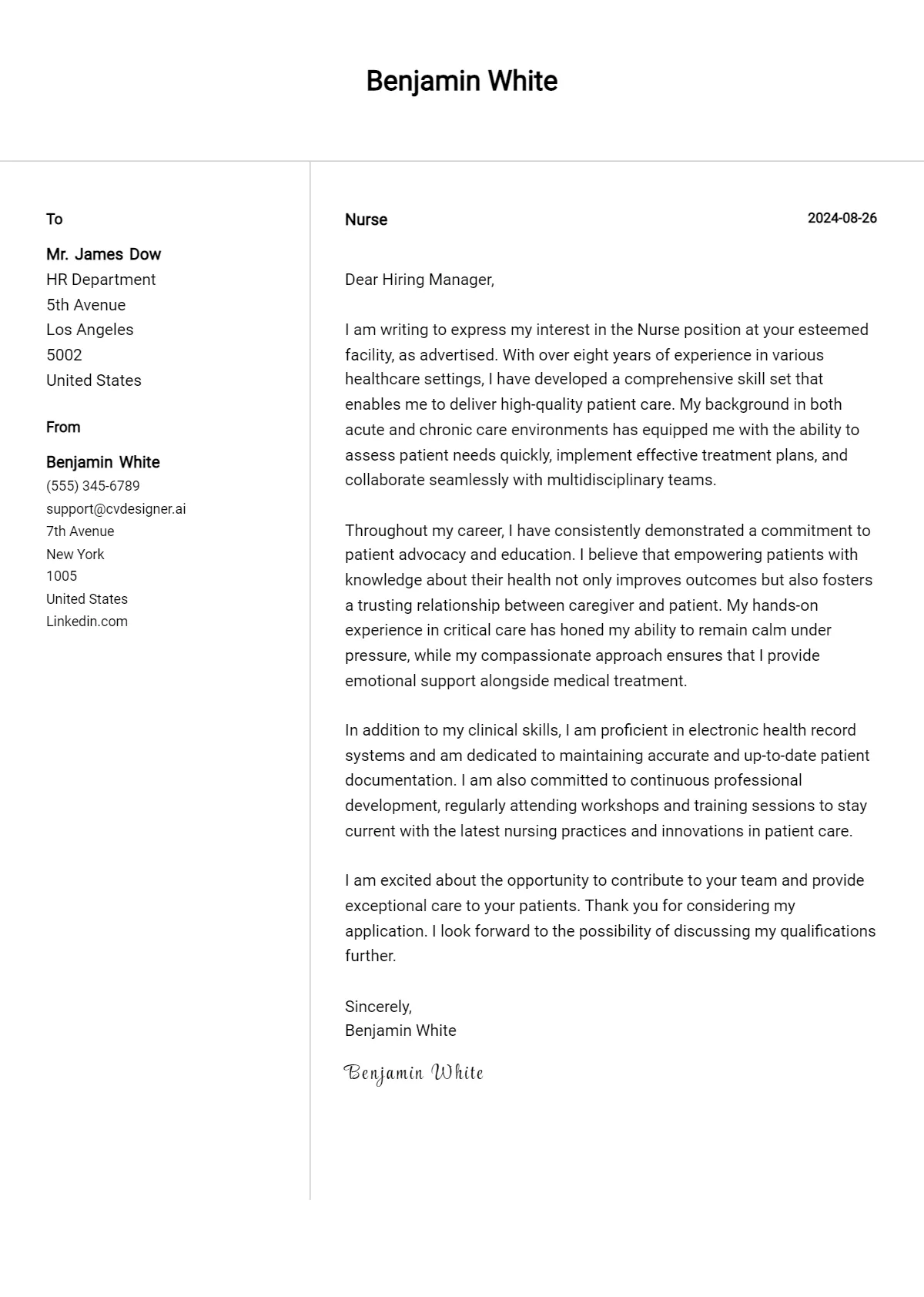
The opening paragraph is your chance to make a strong first impression. State the position you’re applying for and where you saw the job posting. Then, immediately grab the reader’s attention by briefly highlighting your most relevant qualifications or a key accomplishment. This paragraph should be concise, engaging, and clearly state your interest in the position. Consider starting with a compelling statement that showcases your skills or a key accomplishment. For example, ‘Highly skilled and compassionate registered nurse with five years of experience in critical care seeking the [Job Title] position at [Hospital Name].’
Highlight Your Qualifications and Experience
In the body of your cover letter, detail your relevant experience and qualifications. Focus on the skills and accomplishments that align with the job description. Provide specific examples to demonstrate your abilities. Use the job description as a guide and tailor your letter to match the requirements outlined. Mention any certifications, specializations, or areas of expertise that make you a strong candidate. This section is where you provide concrete evidence of your abilities, illustrating how your past experiences have prepared you for the role.
Quantify Your Achievements
Whenever possible, quantify your achievements with numbers and data. For example, instead of saying ‘Improved patient outcomes,’ say ‘Improved patient outcomes by 15% through implementing a new care plan.’ Quantifying your accomplishments demonstrates the tangible results you’ve achieved. Use numbers, percentages, and statistics to showcase your impact. This adds credibility and makes your claims more compelling and shows the hiring manager exactly what you have done.
Showcase Your Skills and Expertise
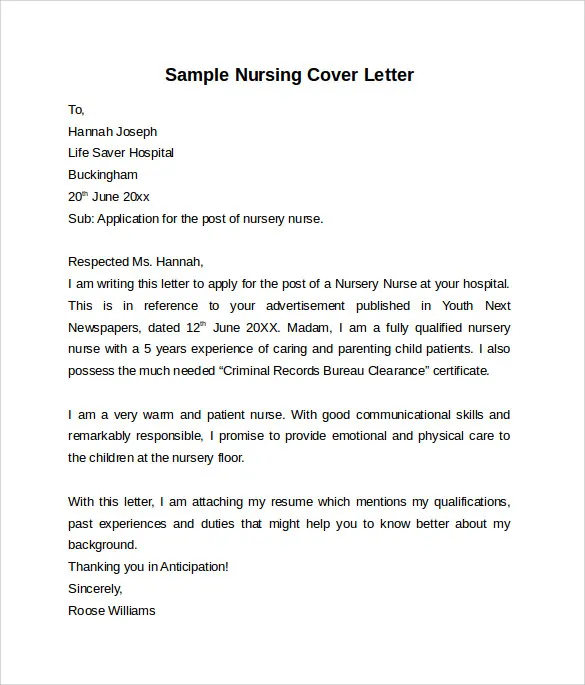
Highlight both your hard and soft skills. Hard skills are technical skills like administering medication, patient assessment, and operating medical equipment. Soft skills include communication, teamwork, problem-solving, and empathy. Provide specific examples of how you’ve utilized these skills in previous roles. Make sure to highlight the skills most relevant to the job description. Consider the skills that are mentioned in the job posting and include those skills with examples of how you’ve used them. Be sure to show how your skills translate to the new role.
Tailor Your Cover Letter to the Job Description
Each cover letter should be customized for the specific job you’re applying for. Carefully read the job description and identify the key requirements and keywords. Use these keywords throughout your cover letter to demonstrate that you meet the specific needs of the role. This personalization shows that you’ve put in the effort to understand the position and are genuinely interested in the opportunity. Demonstrating you fit the qualifications will greatly increase your chances of being selected for the role.
Address the Specific Requirements
Directly address the qualifications listed in the job description. For each requirement, provide a specific example from your experience that demonstrates your ability to meet that requirement. This ensures that the hiring manager can quickly see how your skills and experience align with their needs. Ensure you have matching evidence to ensure you’re selected. If they ask for something specific, provide something specific.
Emphasize Your Relevant Skills
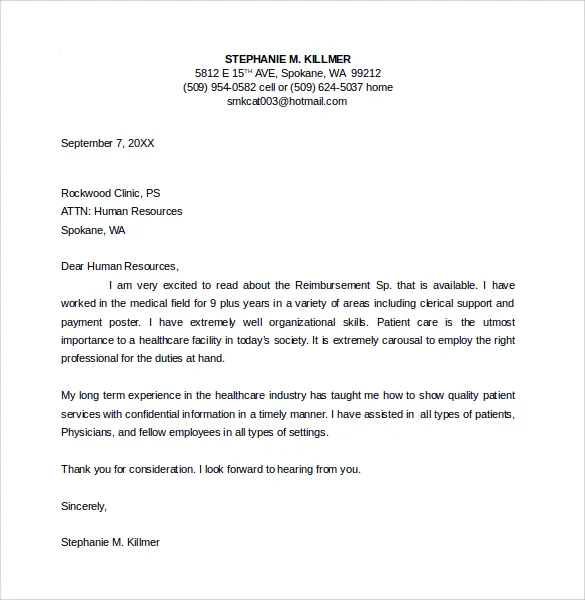
Focus on the skills most relevant to the job. These might include clinical skills like patient assessment, medication administration, and wound care, as well as soft skills like communication, empathy, and teamwork. Provide examples of how you’ve used these skills in previous roles to achieve positive outcomes. By emphasizing relevant skills, you demonstrate that you have the expertise and abilities required for the position.
Demonstrate Your Passion for Nursing
Show your enthusiasm for nursing by expressing your passion for patient care, your commitment to the profession, and your understanding of the hospital’s or clinic’s mission. This can be done by mentioning your personal philosophy of care or referencing the organization’s values. Demonstrating your passion helps to create a personal connection with the hiring manager. This helps them see that you are the right fit for their team. It also helps to show that you have a genuine desire to help others.
Close the Letter Effectively
Your closing paragraph is your last chance to leave a positive impression. Reiterate your interest in the position and express your appreciation for the opportunity to be considered. Keep it concise and professional. This provides a final opportunity to express your enthusiasm and reiterate your interest.
Express Your Enthusiasm
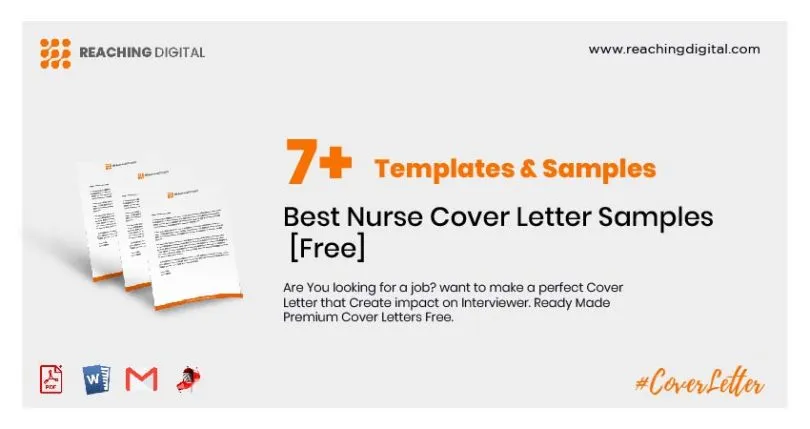
Show your genuine enthusiasm for the role and the organization. Use phrases like ‘I am very excited about the opportunity’ or ‘I am confident that I can make a significant contribution.’ Conveying enthusiasm makes you a more appealing candidate. Letting the hiring manager know that you’re excited helps to show that you will be dedicated and passionate about the role.
Include a Call to Action
End your cover letter with a call to action. State that you are available for an interview and look forward to discussing your qualifications further. This proactive step encourages the hiring manager to take the next step in the hiring process. Providing a call to action makes it clear what you expect the hiring manager to do next. You could use something such as, ‘Thank you for your time and consideration. I am eager to discuss my qualifications further in an interview.’
Formatting and Style
Use a professional and easy-to-read format. Choose a standard font like Times New Roman, Arial, or Calibri, and use a font size of 11 or 12 points. Maintain consistent formatting throughout the document. Ensure proper spacing between paragraphs and sections. The letter should be well-organized, with clear headings and subheadings. Keep the tone formal and professional, avoiding slang or overly casual language. A polished and well-formatted cover letter demonstrates professionalism and attention to detail.
Proofreading and Editing
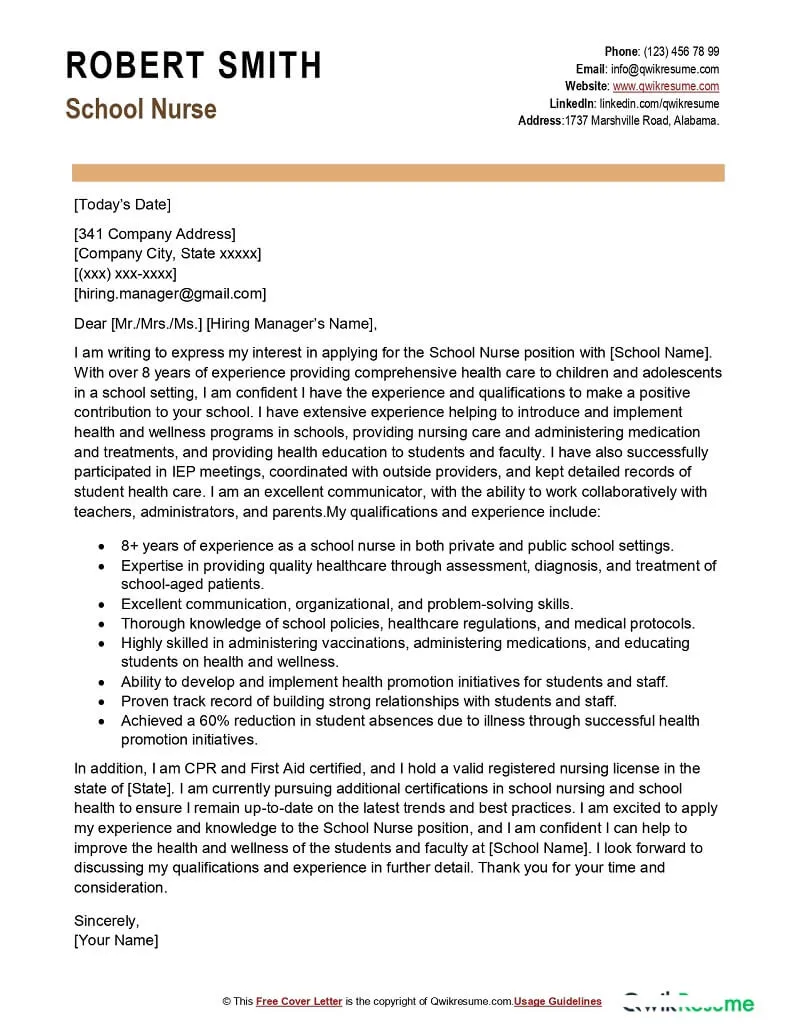
Proofread your cover letter carefully for any typos, grammatical errors, or inconsistencies. Read it aloud to catch any awkward phrasing. Ask a friend or colleague to review it as well. A polished and error-free cover letter reflects your professionalism and attention to detail. Ensure that all the details are correct and that the letter is free from errors. A well-proofread document shows your respect for the opportunity and your ability to present yourself effectively. If you have made any errors, it might cost you a job.
Common Mistakes to Avoid
There are several common mistakes to avoid when writing a nurse cover letter. Being aware of these pitfalls can help you create a cover letter that effectively showcases your qualifications. Avoid these mistakes at all costs to help improve your chances of landing the role.
Using Generic Templates
Avoid using generic cover letter templates without customizing them. Hiring managers can easily spot generic letters. Tailor your cover letter to each job application, highlighting the skills and experience most relevant to the position. A generic template shows a lack of interest in the specific role and organization. When creating a letter, be sure that it aligns with the job’s requirements. If it appears to be a template, the hiring manager may move on to the next applicant.
Typos and Grammatical Errors
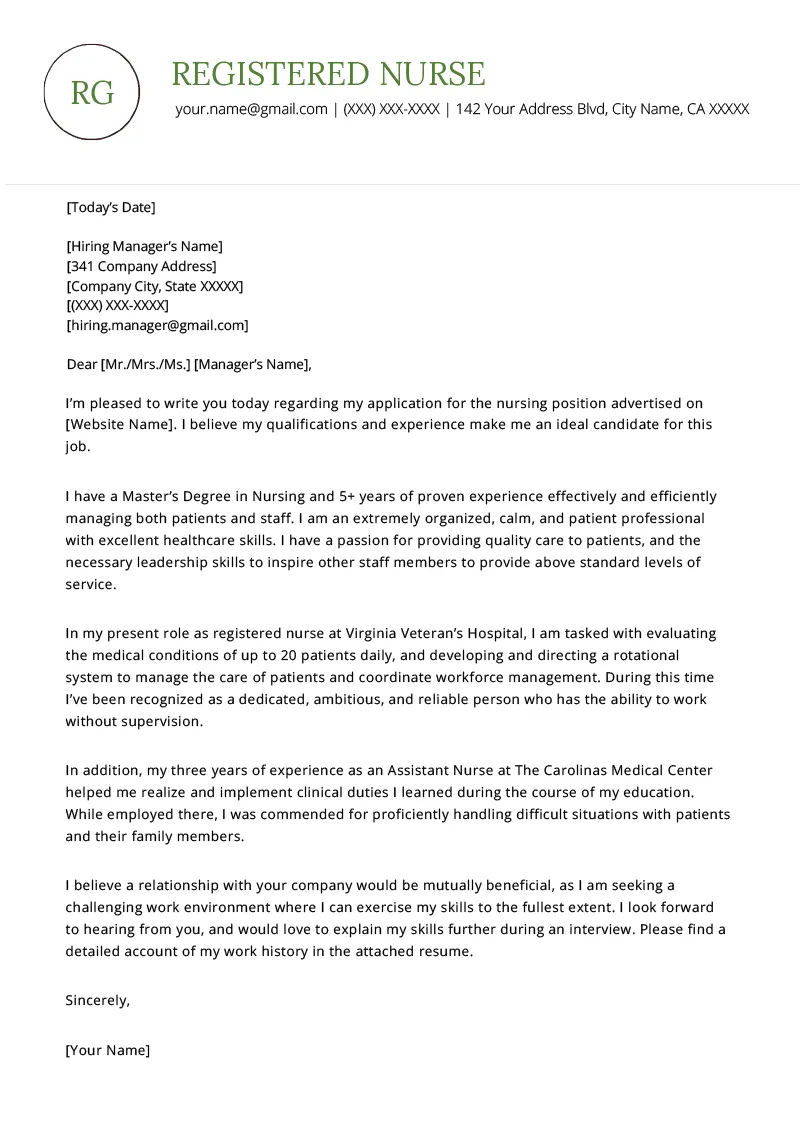
Typos and grammatical errors can undermine your credibility and professionalism. Proofread your cover letter carefully before submitting it. Use spell-check and grammar-check tools, and ask a friend or colleague to review it as well. Errors can make you appear careless or inattentive to detail, potentially harming your chances of getting an interview.
Lack of Customization
Failing to customize your cover letter for each job application demonstrates a lack of effort and interest. Tailor your letter to the specific requirements of the job, highlighting the skills and experiences that align with the position. Generic letters suggest a lack of genuine interest in the role and organization. Customize your letter to meet the job requirements to increase your chances of being selected for the role.
Nurse Cover Letter Examples
Reviewing nurse cover letter examples can provide valuable insights and inspiration. Look for examples that match your experience level and the type of nursing position you’re applying for. Analyze how the examples highlight relevant skills, quantify achievements, and express enthusiasm for the role. Using examples allows you to develop your own cover letter to ensure you are in line with modern standards. This also allows you to showcase your skills and knowledge the right way.
By following these guidelines, you can create a compelling cover letter that effectively showcases your qualifications and increases your chances of landing your dream nursing job. Remember to tailor your cover letter to each job application, highlighting the skills and experience most relevant to the position. Good luck with your job search!
